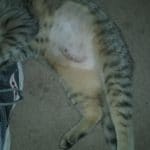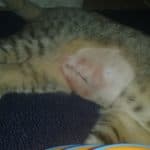Hello,
I think there is always a question of mental health and physical health. So. Make sure she is getting enough physical therapy and emotional therapy. A bored and lonely and painful dog is a withdrawn and depressed dog. Also discuss other options for mobility. Like swimming or a cart. And get outside. A lot! Dogs needs to be getting their nose in the air and feeling involved in the world. They also need to be consistently monitored for medical complications and changes. I hope this helps. Let me know.
Hello! I rescued a stray domestic shorthair that came crying at my door about 6 months ago and named him Koda. He is the sweetest boy of about 5 years (not too sure about his age though) and I am so grateful of the love he has shown me. Since I’ve had him, there has been nasal discharge on one side of his nose. He began sneezing after a while and I noticed large chunks of hardened mucus would come out. I took him to the vet and he was put on antibiotics and they cleared out most of the build up. The vet also did an x ray and it showed that one side of his sinuses were completely backed up with mucus, so he did a blind bioscopy to look for polyps and could not find anything. The antibiotics seemed to work at the time, but now looking back I’m assuming it was because the they had cleared out most of the mucus, because the symptoms came back after about a week after stopping antibiotics. We are now looking at constant snoring sounds, occasionally gasping for air, sneezing and decreased appetite due to not being able to smell his food. The vet recommended us to someone that had the proper technology, which would be a scope and a ct scan to go in and look for any polyps, and remove them if found. This would cost me $1500-$3000 which I cannot afford since I am a college student 🙂 I went anyways to get their opinion and stupidly spent about $1000 on more testing, appetite stimulants, and more antibiotics that didn’t work. I am considering trying steroids to try and lessen the symptoms just so that he can have an easier time breathing if they worked, but I am afraid of the cost and especially the side effects, if it it doesn’t help that will be more wasted money. Recently, the nasal discharge has spread to the other nostril and he has more bloody mucus than ever before, and as of three days ago, a mucus-like mass has protruded from one nostril and has slowly turned black and bloody over these few days. I tried to remove it but it was very stuck and started bleeding, and I could tell the poor baby was in pain. It may be a polyp that has slowly moved out of his nose, so I will be calling a vet tomorrow to hopefully get it taken out.
I am looking for another opinion on what might be going on or of any similar stories. If anyone knows any good vets in the Tampa, Florida area I would be forever grateful. I am willing to take Koda anywhere in Florida if it means I can find help for less money or just more straightforward people who care about animals and not just the money! Koda is still a happy and loving cat but he has slowly become less playful, and I can tell he does not feel his best becsause of all of this. I am afraid of how much worse it can get. Thank you so much for any help in advance!
Comments
Hi, on November 23 our dog Darla was diagnosed with IVDD and was put on cage rest and given meds. As of today I feel like she’s gotten worse. She used to walk some when we took her outside to use the bathroom. Now she refuses to walk unless she really needs to go. And it’s only a few steps. Whereas before she would walk way more. Her front legs now are weak and her paws don’t flip over like they did. She does react with all legs when I pinch between the toes. The front legs are more delayed but she does pull them in. She doesn’t seem to be in pain anymore as she used to yelp out and whine when we picked her up. We’ve been to two vets (the second to get another opinion) and both agreed to the original findings. We have started cold laser therapy and she’s had one session so far. I’ve also started doing physical therapy on her after watching your YouTube videos etc. is there anything else I should do? She used to wag her tail and now just seems so sad. Is it possible for her to loose so much muscle mass that she’s so weak? When the weighed her she had lost 3 lbs but the vet said it was because she hasn’t been active. I can feel her bones protruding out. (she was small to begin with and was very active) she does eat and drink normal. The second vet did say I could give more pain and muscle relaxer.( every 8 hours as opposed to 12) Maybe the muscle relaxer i need to cut back on? I’m just at a loss and so sad she isn’t getting back to normal by now.
Comments
My 6-year-old cat has recently had some trouble breathing. She gets a deep sounding snore when breathing in and can’t seem to take a complete breath. The snoring only seems to occur when she is breathing in, and not out. The snoring does sometimes stop. This mainly happens when she is sleeping, her breaths are softer and she seems to be able to breath better. I have also noticed that when I hold her mouth open a little bit, she is able to breathe in and out without any problem. She occasionally has sneezing fits, but they are very rare to see. There is no discharge from her nose, eyes, or ears. She actually has a very dry nose. I have also noticed that she has been eating less than before, but she is still able to eat and drink water. We took her to a vet, but they told us they would only be able to diagnose her with an endoscopy, which they said would cost us around $1,300. I’ve looked online for symptoms similar to hers and cats that had similar breathing patterns/sounds. The closest thing I have been able to find is something called a “nasopharyngeal polyp”. I’m a little lost on what to do. Should I continue with the first vet, and get a concrete diagnosis? or get a second opinion and maybe bring up what I found while researching online? The cost of the first vet is kind of high for me as I’m a college student, but If it is what my cat needs to be able to breathe comfortably again I’ll pay it.
Comments
We have a lab almost a year old. She wont eat out of her bowl. She will eat the dog food if we put it in our hand but she wont eat it out of her bowl. She will eat other treats and table food. She also seems very lethargic per her usual self. We have been watching to make sure she is still pooping but something just seems off. What should our next steps be? Should we try changing dog food? Could she be going into heat?
Comments
I am so lost in caring for my Chihuahua/dachshund mix. She was diagnosed with IVDD on Sunday December 15, 2019. Surgery was not an option financially so we opted for conservative treatment combined with acupuncture and the Assisi loop treatments. The one thing I can not get a definitive answer on if she needs to 24/7 cage rest of if letting her rest with us on the couch in the evenings okay. Some blogs says strict cage rest for 8 weeks and only out for potty time while many others suggest other treatment plans. I just want to know if I am hurting my fur baby by letting her rest on the couch with me or not. Since the start of her treatments she has gone from full paralysis in her hind legs and being in continent to being able to walk a little and has full control over her bladder/bowels in just a little over a week!
Comments
I have a 4 year old miniture dachshund that suddenly couldn’t walk anymore we took him to the emergency room and they took some x Ray’s and stated that there were a couple disks that looked concerning. We were told to keep him in the cage for 4 weeks and see how things go 2 days he seems worse so we took him to the vet and they said make sure that he continues to eat and drink and urinate. IVDD surgery seems like one of our only options however, I dont want it to fail and have him be in more pain any suggestion?
Comments
I just had my 5 month old kitten spayed on Friday Dec 13, 2019. On Sunday there was a good amount of bruising. Today is Thursday and day 6 of recovery and there is a bump a little smaller than a ping pong ball that is under the stitch line. Does this look like it is just a fluid sac or do you think a hernia? She runs, jumps, is and has been very active, eats, pee, poop, everything else is normal. I push on it and no reaction from her, there is no fever to it either.
First picture is the bump on day 6. Second picture is her stitches on day 6 of healing. Third picture is what her belly looked like on Day 2 and 3 after spay.
Comments
Hi Dr Magnifico. Our once feral cat Daisy has been going to her litter box all day every 2-5 minutes trying to urinate. Only a small drop or two comes out. She looks like she is in pain. We brought her in a couple years ago for this. She is extremely hard to get in a carrier or trap to bring her in and she is untouchable, she is still very feral like.
Can you prescibe the same thing she was prescibed before? I am going to have a very hard time getting her in a carrier or trap to bring her in, and she needs medication ASAP.
Terri Stiffler
Comments
My dog was Originally prescribed Gabapentin (50mg) every 12 hours but when I went back to the vet they allowed Me to do every 6 hours instead because pain seemed to be coming back faster. Now it seems the pain meds are not helping at all even with putting him to sleep. Can I give it even sooner than every 6 hours? My dog is 8.10 lbs.
Comments
I have a 12 year old female cat. She was obese for several years. I managed to get weight off of her a few months before these issues. There has been a lot of urination outside of the box. The urination has been going on a long time and initially I thought it was behavior because I adopted a rescue dog in October 2018 she hasn’t been thrilled about the dog. Right around the time my cat turned 12 she started with the urination… February or March.
In the last couple of weeks her thirst increased significantly. Also just laying on her side on the floor, not wanting to be in her bed or on the furniture. She’s losing weight /muscle mass and she is hoarse. She is still eating, I had to coax her a bit one day so I made chicken broth from drumsticks she’s been drinking a good amount of the broth and ate chicken and her canned food. She’s actually been gulping the food down.
I can’t tell if this is kidney related or diabetes. I have not noticed bad breath. I am in a real bind and need to figure out what else to do for her till I can get money for a vet.











Hello,
Thank you for saving this kitty. In some cases these guys are chronic upper respiratory kitties, or herpes, or a few other harder to treat things. I would talk about a nasal flush and long term lysine and even rotating antibiotics. See if there is a feline specialist near you. And be honest about your budget. See if they can help. I wish you the best of luck!